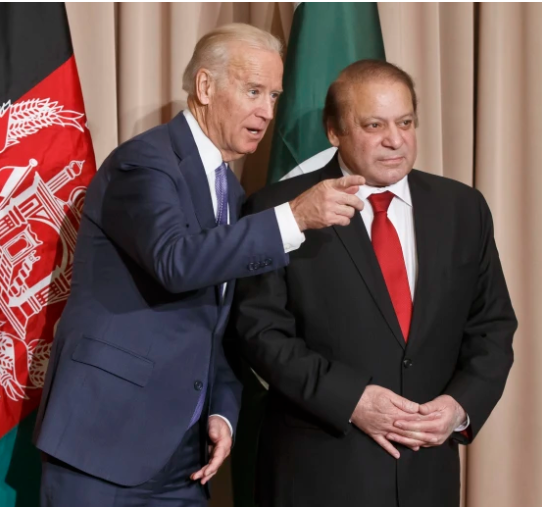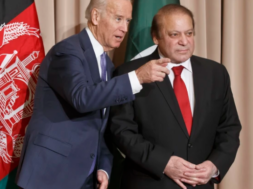
Roving Periscope: Is the US trying to shift the M-E war from Gaza to Iran, via Pakistan?
Virendra Pandit
New Delhi: Can a nearly bankrupt Pakistan dare attack a relatively prosperous and better-armed Iran, suspected of having nuclear weapons as well?
Did an unstable Pakistan, which is going to parliamentary polls on February 8 to potentially elect the army-supported Nawaz Sharif again, as the PM and is beset with multiple crises, consult the US before launching a missile counter-attack inside Iran on Thursday morning?
Is the US, where President Joe Biden is also seeking re-election this year, worried about the zero-sum game in the over 100-day-long Gaza War, despite over 25,000 deaths, and shifting geopolitics and alliance architecture in the Middle East, now trying to divert the focus to Iran, via Pakistan?
Why did the US on Thursday evade a question on whether Pakistan held prior consultations with Washington before conducting retaliatory air strikes on Iran?
Questions that may find answers in the next few days.
Although Pakistan has told Turkey and others that it did not want escalation, Iran is not sitting idle.
Apparently, in a final warning, Iran said on Friday that it successfully carried out an air defense drill using drones designed to intercept hostile targets in an area “stretching from its southwestern to southeastern coasts.”
According to media reports, Pakistan “consulted” the US before conducting strikes in Iran. However, State Department spokesperson Matthew Miller, during a regular press briefing in Washington, said, “I do not have any private conversations to read out.”
He merely said the US is concerned about the escalating tensions in the region and has urged restraint on all sides.
There is no need for escalation in the matter, he said, adding the US has noted Islamabad’s comments about the importance of “cooperative relations between Pakistan and its neighbors.”
Asked how the US administration reads the situation between Iran and Pakistan, Miller said, “We are concerned about escalating tensions in the region. It’s been something we have spoken several times, we’ve focused on. We’ve been incredibly concerned about the potential for escalation since October 7.”
On October 7, 2023, the Sunni Hamas terror group launched a deadly attack from Gaza into Israel, killing over 1,200 people. In retaliation, Israel struck back and has so far killed over 25,000 Palestinians in the ongoing war, keeping the US-led West on the tenterhooks as no ceasefire has followed.
“That’s why we have engaged in intense diplomatic efforts to try to prevent escalation. We noted the comments from the government of Pakistan, about the importance of cooperative relations between Pakistan and its neighbors. We thought those were productive useful statements, and certainly, there’s no need for escalation and we would urge restraint on all sides in this case,” he added.
Then, Miller acknowledged Pakistan as a major non-NATO ally and called Iran a major funder of Hezbollah and a principal supporter of Hamas for years.
Asked about the fresh tensions between Iran and Pakistan after strikes and counterstrikes, he said, “I think I made pretty clear yesterday what we think about Iran’s attacks, not just the strikes that were launched in the past three days against three of its neighbors but its long history of funding terrorism, funding instability and sowing discord in the Middle East. That’s something we have seen contribute to conflict in Gaza.”
Tehran’s missile strikes in Pakistan’s Baluchistan came days after Iran’s Islamic Revolutionary Guard Corps (IRGC) launched missiles into Iraq’s Kurdistan region at what it called an Israeli “spy headquarters” and at alleged ISIS-linked targets in Syria, Al Arabiya News reported.
In retaliation, Pakistan on Thursday launched missile strikes into Iran and codenamed it Operation Marg Bar Sarmachar.
Pakistan’s Ministry of Foreign Affairs (MoFA), in a statement, said it had undertaken a series of “highly coordinated and specifically targeted precision military strikes against terrorist hideouts” in the Siestan-o-Baluchistan province of Iran.
“Several terrorists were killed during the intelligence-based operation codenamed Marg Bar Sarmachar,” it said.
How is the Gaza War now potentially shifting to Iran?
Miller said: “You have seen Iran as the principal supporter of Hamas for years. They are the major funder of Hezbollah. They are one of the major funders of the Houthis. We have seen the consequences of the actions that Iran has taken to add to regional instability and that’s why we continue to take actions to hold Iran accountable and also send clear messages to Iran that we don’t believe this should escalate in any way, shape or form.”
“Pakistan is a major non-NATO ally of the United States, and that will remain the case, but we would urge restraint in this case. We do not want to see escalation and don’t think there’s a need for escalation,” he added.
US National Security Council Coordinator for Strategic Communications at the White House, John Kirby, said the US is monitoring the situation regarding Iran and Pakistan “very very closely” and they do not want to see escalation.













